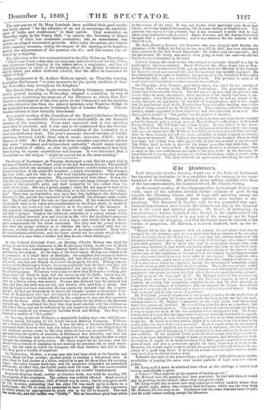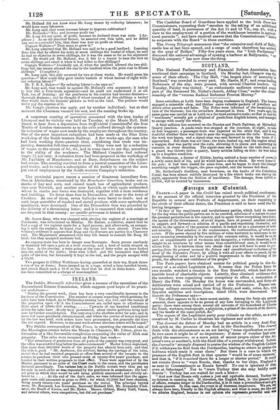gig Vrobinces.
Lord Alexander Gordon Lennox, fourth son of the Duke of Richmond, has accepted an invitation to be a candidate for the vacancy in the repre- sentation of Shoreham. His political views entirely coincide with those of the late representative, his lamented friend, Mr. Charles Goring.
At the annual meeting of the Gloucestershire Agricultural Society last week, some of the speeches afforded further evidence of good feeling towards the labouring classes, and of hope still surviving among the afflicted agriculturists, though some speakers were resolute in des- pondency. The Reverend E. Knollys said, he was persuaded that agri- cultural improvement must benefit the labourer not only in his temporal but in his social and spiritual position. Mr. Beach, of Redmarley, (a tenant-farmer,) leaving remarked that though in his neighbourhood the laud WIlo cultivated as well as in any part of the country, yet he found many labourers out of employ, and that the farmer must be relieved of the burden of pauperism, Mr. Holland, a resident landlord, took up the re- mark— "Deeply did he feel, in common with all present, the sad winter that was in prospect for the labourer; and he was quite sure that he expressed the meaning which had fallen from Mr. Beach when he said, that the coming distress of the labourers would touch more deeply and tenderly their feelings even than it would touch their pockets. But he knew this, that in every great change that took place—and therefore in that which was taking place—the man of the least intel- lect was he who suffered most. And it appeared to be one of the laws of civili- zation—one of the conditions of the advance of the country in intelligence—that those who were lowest in society must suffer in the change. The landlord, who, to a certain extent, could exert a control over those who employed labourers, as well as over those whom he employed, having the advantage of education, ought to be the most prompt in intellect on these points. These, he was certain, would endeavour to alleviate the condition of the labourer; and although the prospects of pauperism were great, he knew also that where there was good farming, pauper- ism fell away at the very sight of it" Mr. Holland enforced this assertion by quoting from memory instances given in the Poor-law reports, in which good fanners, on coming Into pauperized neighbourhoode, lead by their example so heightened the character of cultivation and the demand for labour, that all the paupers were gradmdly absorbed and a want cleated for imported labour. If this were SO in One parish, why not in all parishes? Mr. Fulljatnes jocosely announced a ten-pound premium for the production of the best animal to carry the farmer, not across the country but through the agri- cultural distress: Mr. Holland c, lamented on the reply Made, that the animal must be a species of landlord. He was willing to do leis duty as a landlord, but not to be the animal required. "His duty as a landlord was very simple and plain; it was to make the most of the raw material which belonged to him. He main- tained, that if a man had the disposition of ally raw material, whether it be capital, manufactured goods, or land, his duty was plain; it was to do what everybody else would do. He would be a very foolish fellow if he (lid not, in as fair a way as he could, make the mast of that raw material." In such negotiations, he maintained that the interests of landlord and tenant were not at variance; fur the matters of reserving game, and of bargaining for the tenant's vote, had nothing bode with the raw material. If the landlord threw aside all ideas except that of good cultiva- tion—if he were determinel simply to have good tenants, and determined to work' the land as it ought to be worked—there they had a good competition as to the price of land, and also a protection against its beirg more than it ought to be. However, the tenant ought never to invest his properly in the soil without the se- curity of a good long term: if he had not a lease—tenant-rights were no doubt very good, but he should have a lease.
Towards the end of the proceedings, a dialogue of difficulties arose on the possibility of paying the same rent under periods of high and low wheat prices. Mr. Long said it must be admitted that wheat at five shillings a bushel bad- become unprofitable to grow. A Voice—" That depends on the number of bushels grown.'
Mr. Holland said, the question had been answered: he had told theta it would pay by growing twelve bushels where they had grown eight. Mr. Long would like to know bow they could grow twelve bushe's where they had grown eight, unless they redoced their lehourers, which was the very thing Mr. Holland did not wish to do. The farmer had the same rent and taxes to pay; and he could reduce nothing except leis labourers.
Mr. Holland did not know what Mr. Long meant by reducing labourers; he would have snore labourers. Mr. Long said, they must increase labour to improve cultivation? Mr. Holland—" Yes; and increase profit too."
Mr. Long did not speak of profit, because he declared there was none. (Ap- plause.) As an old practical farmer, he asserted over this table, and he defied any one to contradict him, that there was now no profit on wheat.
Captain Walters—" Then cease to grow it." Mr. Long admitted that Mr. Holland was said to be a good landlord. Learning from him that he offered his rents at seven shillings the bushel of wheat, he said he had no objection to seven shillings, for it was the same as far as his argument went. He would ask Mr. Holland, was it fair to a tenant to base the rent on seven shillings and exact it when it had fallen to five shillings? Captain Walters—" Decidedly not, if; when the landlord allowed the two shil- lings fall, the tenant allowed the rise to the landlord when the price rose to fifteen shillings." (Laughter.) Mr. Long said, this only occurred for two or three weeks. He would press his question— How could they grow twelve bushels of wheat instead of eight with- out reducing labour?" Mr. T. B. L. Baker—" By reducing labour l.—he says so." Mr. Long said, that would be against Mr. Holland's own argument; it looked to him like a Free-trade argument—and he could not understand it at all. Talk, too, of draining: all the gentlemen in his country had become drainers— thorough drainers ; and he thought if wheat remained at five shillings a bushel they would drain the farmers' pockets as well as the land. The produce would never pay the expense of it. Mr. Long's question was again put by another individual; but at that moment the Chairman vacated his seat, and the meeting broke up.
A numerous meeting of operatives connected with the iron trades of Liverpool and its vicinity was held on Tuesday, at the Music Hall, Bold Street, to hear from a deputation from the:Central Committed!of the Iron Trades of London statements as to the evils suffered through the systema- tic reduction of wages now made by the employers throughout the country. One of the most important reductions had been made at the Nine Elms workshop of the South-western Railway. A few weeks ago, the men who had been working three-quarters time, considering that trade was im- proving, demanded full-time employment. They were met by a reduction of wages, to the extent of 3d., 6d., and in some cases Is. per day, according to the ability of the workmen. The Midland Counties had reduced wages 7:V per cent. A reduction there had been proposed in the workshop of Mr. Fah:bairn of Manchester; and at Bury, disturbances on the subject had arisen. The meeting resolved to form a central committee of the Liver- pool trades, and to raise a subscription of 2d. weekly to support the men put out of employment by the South-western Company's reduction.
The provincial papers report a number of disastrous incendiary fires. One at Altrineham, mentioned by the Manchester Guardian, broke out on stacks of hay and corn, and caused much loss of agricultural produce. One near Norwich, and another near Ipswich, at which again unthreshed wheat in stacks and barns was destroyed, together with a farm residence and buildings. No fewer than four in Devonshire, all near to the town of Crediton. At one of these, seven bullocks were burnt to death; and at each large quantities of stacked and stored produce, with some agricultural machinery, were destroyed. One of the Devonshire fires was preceded by the delivery of a threatening letter; and it is rumoured that such missives are frequent in that county: no specific grievance is hinted at.
Mr. James Boag, who was charged with altering the register of a marriage at Colchester, was reexamined on Monday. Mr. Barnes, a solicitor, stated that he had a copy of the register made for a legal process; and afterwards, on compar- ing it with the register, he found that the latter had been altered. From this witness's evidence it appears that Boag and the Fenners are parties in a Chancery suit. The Magistrates announced that they felt bound to commit Mr. Boag for trial; but they accepted moderate bail.
An express-train has been in danger near Ramsgate. Some person carelessly or wantonly left open a gate at a level crossing, and a herd of cattle strayed on the line: in the evening, a train going at the rate of forty miles an hour dashed into the midst of the cattle; three were killed; and the locomotive was lifted quite off the iron, but fortunately it kept to the rail, and the people escaped with a fright.
Two paupers in Clifton Workhouse having quarrelled at their tea, Roach threw a can of tea at Jones- Jones jumped up in a rage, seized a long-handled broom, and struck Roach such a blew on the head that he died in three hours. Jones has been committed on a charge of manslaughter.



























 Previous page
Previous page